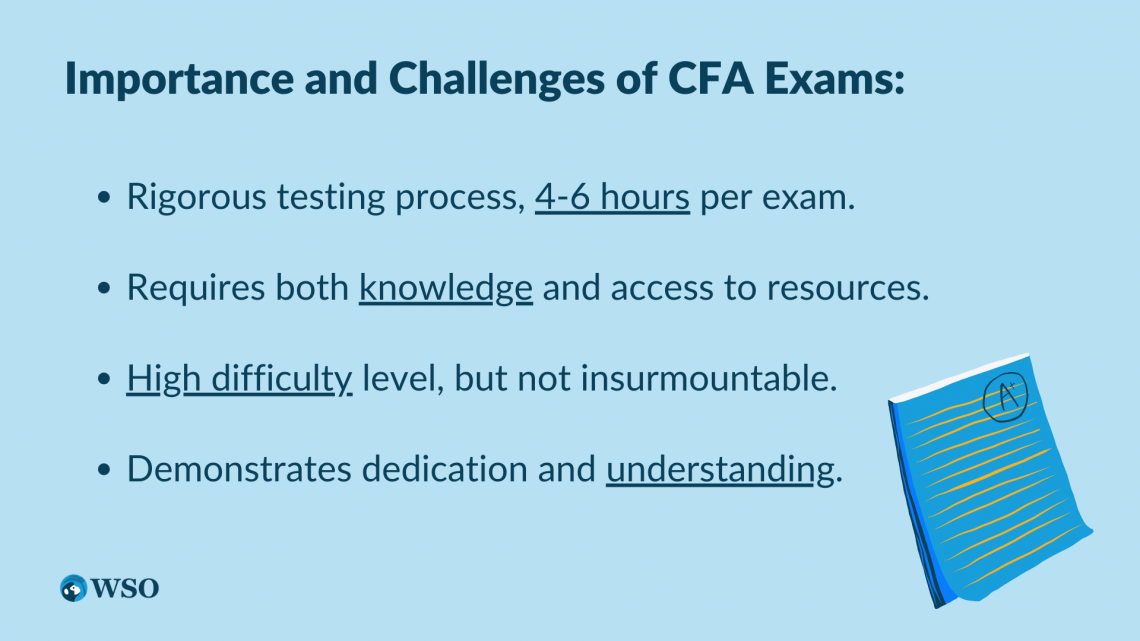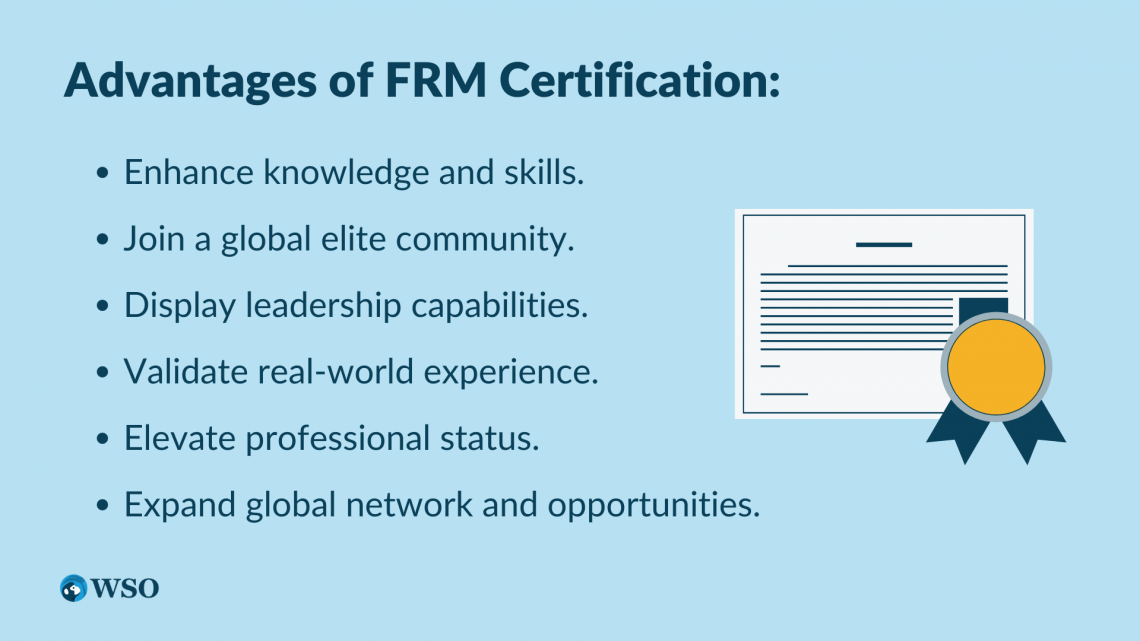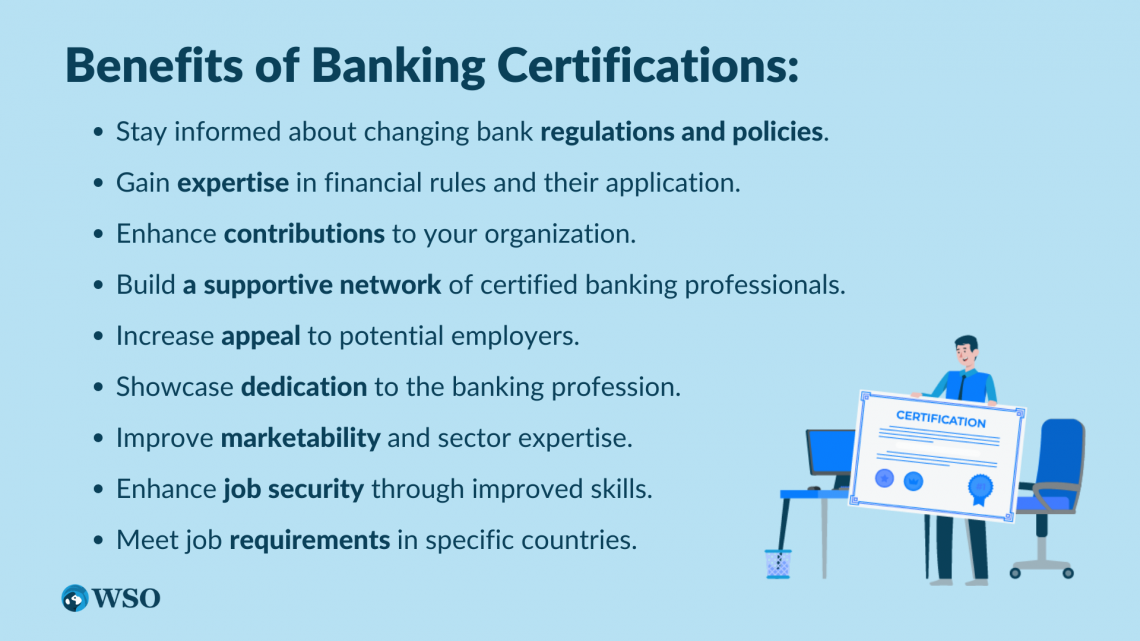Banking Certifications
Comprehensive Banking Certifications for Industry Professionals to Enhance Financial Authority
What Are Banking Certifications?
Banking certifications are credentials that individuals can earn to validate their knowledge, skills, and expertise in various areas of banking.

These certifications often require passing examinations, meeting specific educational requirements, and accumulating a certain number of work hours in the banking industry.
A banking professional may be able to earn more money and advance more quickly in their career with the aid of certificates.
Even though banking certifications are not required, informed investors and customers respect banking professionals who put in the time and effort to earn the accreditation because it attests to their high moral and professional standards.
Having the necessary banking certifications can improve your reputation and put you closer to gaining a promotion if you consider pursuing a career in banking.
Such certification requires a specific number of study hours and exams to pass such certifications.

As a result of advancements in the IT sector and ongoing process automation, the banking industry has evolved quickly. It resulted in an urgent need for resources and competent labor. Certifications support the development of the banking industry.
These certifications increase your understanding of the laws and regulations that control banks and other financial organizations, offer a sense of how the industry operates, and prepare you for risk.
In addition to their graduating degrees, commerce majors who want to work in banking and finance should concentrate on these certifications.
These programs give you a professional advantage, give you firsthand knowledge of the challenges faced by the field, and ultimately pay off for your career.
Key Takeaways
- Banking certifications can improve a professional's reputation, enhance career advancement opportunities, and earn higher salaries in the banking industry.
- There are various types of banking certifications, such as CFA, CFP, FRM, CAIA, CPA, CMA, and CMFC, each offering expertise in different areas of banking and finance.
- Banking certifications provide practical knowledge, understanding of industry complexities, and keep professionals updated with regulatory changes.
- These certifications can lead to career opportunities in investment banking, financial planning, risk management, and other specialized roles.
- Some certifications are mandatory for specific roles in certain countries, making them essential for professionals working in the banking sector.
Types of Banking Certifications
The financial sector, with banking at its core, represents one of the most crucial industries. The banking field offers a multitude of certifications, each designed to accommodate distinct areas of expertise, skill levels, and industry specializations.

Such certifications are not just academic credentials, they also provide a practical understanding of the banking industry's landscape, complexities, and evolving trends.
If you find yourself as an industry newbie or an experienced professional looking to expand your knowledge, these certifications offer numerous opportunities for growth and advancement.
Chartered Financial Analyst | CFA
Chartered Financial Analysts, One of the most well-known and in-demand credentials for people working in banking and finance is the CFA qualification. The Chartered Financial Analyst Institute is in charge of administering the certification.

Professionals are expected to finish and pass all three levels of the CFA program. A financial expert with a CFA designation is highly recognized in the banking sector. They are subject matter specialists in many areas, including:
- Stock Research and Analysis
- Investment Banking
- Economics
- Portfolio Management
Financial analysts with CFA degrees can find employment in businesses such as:
- Consulting
- Investment Banks
- Mutual Funds
- Insurance Companies
- Hedge Funds
A complex exam process led by an internationally renowned organization is required to obtain the chartered financial analyst (CFA) designation. The ability to progress in various positions can be improved by obtaining this certificate, such as:
- Risk Manager
- Financial Adviser
- Chief Financial Officer
- Portfolio Manager
This article defines the CFA charter and lists the various advantages of being a CFA charter holder. Because of the CFA's widespread reputation and esteem, obtaining a CFA charter may increase your chances of advancement in the financial industry. Suppose you chose to explore a different career route. In that case,with a CFA qualification, you could potentially work as a:
- Corporate Financial Analyst
- Chief Financial Officer
- Risk Manager
- Asset Manager
- Financial Consultant
- Stockbroker
A CFA can increase your chances of landing a new job and improve your promotion and employment prospects with an international company. Employers can see that you have advanced financial expertise by looking at your CFA designation on your CV, which may help you land an interview.

The CFA tests are challenging and last four to six hours each. During that time, candidates must finish 180 questions on the Level I exam, which is problematic.
Candidates need more than just brains and endurance to succeed. They also require access to the appropriate tools. The CFA tests are not simple, but they are also not insurmountable.
Although the CFA examinations are challenging, gaining this certification is worthwhile since it shows a high degree of dedication and understanding. In addition, there is a good chance that it will result in higher earnings than non-chartered colleagues.
Additionally, passing the examinations entitles you to employment in numerous fields that demand this level of financial knowledge and expertise. Unfortunately, CFA tests are known for their difficulty.
Even more difficult than medical or Law school tests, they are frequently regarded as "bar none," the most challenging exams. Pass rates typically hovered around 50% and were significantly lower during the last pandemic.
Should you be discouraged from taking these examinations in light of this? Not at all. The path to obtaining your CFA designation will be challenging and will include many years of study and commitment.
There is no better way to succeed if you are in it to win it than to put in the effort to study, practice, and take the test. Unfortunately, CFA exams are graded on a pass or fail basis. The average pass percentage for these tests is roughly 50%, which suggests that half of the candidates do not succeed.
Certified Financial Planner | CFP
The CFP certification is provided by the Certified Financial Planner Board of Standards. In addition, applicants must pass a course covering more than 100 topics, such as:

- Insurance
- Personal Finance
- Estate Planning
- Stocks and bonds
Candidates must pass a demanding seven-hour final test of the course.
A financial planner who has already passed the CFP exam and been granted a CFP Board practice license works with clients to help them comprehend their investment options and make wise financial decisions depending on their circumstances.
The CFP Board periodically publishes information on the fundamentals of financial planning because clients have high confidence in these professionals.
The benefits of CFP certification go far beyond the perceived legitimacy offered by the CFP symbol. The distinctive skill set and personal network CFP professionals develop while obtaining certification lay the groundwork for a successful career in this expanding industry.
Financial Risk Manager | FRM
The GARP, which awards the FRM, requires its candidates to pass two levels of this certification. Periodically, the curriculum is updated to reflect new developments and trends in risk management.

Professionals who complete the FRM certification program frequently work in banks as risk analysts and officers, advising private clients on risk management and sensible investment choices.
Professionals with the FRM certification employ financial instruments to control exposure to:
- Credit Risks
- Market Risks
- Liquidity Risks
You can differentiate yourself in the financial services sector with the FRM designation. Professionals in risk management with the FRM certification are employed by several of the most prominent financial institutions.
Why do these companies seek financial experts who hold the FRM designation?
- They possess particular characteristics that are significant to providers of financial services.
- A different method of addressing financial decision-making is risk management.
The FRM Program teaches you how to:
- Effectively recognize and assign potential risks
- Reduce those risks
- Offer suggestions for better judgments on all risks
- Create risk management plans
Benefits of FRM:
- Increase your knowledge and skill.
- Be a part of a global elite group.
- Showcase your leadership abilities at work.
- Verify your accomplishments with experience from the real world.
- Improve your standing.
- Strengthen your connections on the world stage.
- Expand your global opportunity pool.
Chartered Alternative Investment Analyst | CAIA
Professionals who desire to launch a career handling alternative investments, like asset management or hedge funds, should pursue the CAIA certification. However, it takes between 12 and 18 months to finish the study and take the tests for the two levels of the CAIA course.

Chartered Public Accountant | CPA
The CPA is broken into two types: the Canadian and International CPA. The Canadian one is unique for Canada, where it has slight differences from the international one; it also has some unique aspects over the international one.

The highest level of methodological proficiency and achievement is symbolized by the CPA qualification, which is highly regarded in today's business. A minimum of 150 hours of coursework are needed for the CPA certification, which covers various subjects like:
- Risk Management
- Financial Reporting
- Auditing
- Taxation
- Company law
Before they may provide audit and tax services in public accounting, candidates who pass the CPA courses and tests need a CPA license. To succeed in obtaining a CPA license, you should possess several necessary traits:
- Analytical abilities: You need to be able to spot issues before they become obvious and have an impact on the bottom line.
- Organizational skills: You'll need to be able to get your hands on the many documents rapidly you'll be handling for a variety of clients, both electronically and on paper.
- A keen eye for detail: Sometimes, transposing even two digits can result in calamity.
- Communication and interpersonal skills: are essential in this line of work because you'll frequently engage with people, and not all of them will be pleased with what your CPA tells them.
The duties of a CPA vary depending on the position they hold; however, some are as follows:

- Get financial statements ready.
- Check the correctness of the financial accounts as well as the effectiveness of the systems and processes.
- Prepare and maintain all financial records.
- Prepare tax returns, schedules, and other paperwork, ensuring they are filed on time and that all taxes are paid promptly.
- Meet with the management to discuss potential adjustments that could boost sales and cut expenses.
- Create and keep up-to-date reports.
- The Securities and Exchange Commission's annual reports must be reviewed and approved.
Certified Management Accountant | CMA
The institute of management accountants offers CMA. Candidates must complete 11 financial competency tests, divided into two parts.

The corporate aspect of the firm is open to finance professionals with the CMA certification. They employ their expertise to help the business make intelligent financial decisions.
Chartered Mutual Fund Counselor | CMFC
The College of Financial Planning offers a ten-week financial course leading to the CMFC accreditation. To be recognized as a mutual fund expert, candidates who enroll in the CMFC course must pass an exam after the program.

Candidates who have earned the CMFC certification can better comprehend the intricate nature of the mutual fund sector and other packaged investment products.
Banking Certification Real Life Example
For example, in Canada, to be able to work in specific positions in the banking sector, you will need particular license/ certifications such as:

- Investment Funds in Canada | IFC: this certification will permit you to sell mutual funds and other types of investment.
- Canadian Securities Course | CSC: This course consists of 2 tests you need to pass to get your certification, which will let you trade a more comprehensive option of investments for your clients.
- Personal Financial Service Advice | PFSA: this certification will help you reach positions such as a Financial Advisor, Investment Advisor, and Account Manager.
- Personal Financial Planner | PFP: it is designed for people who want to work as financial planners in the banking sector; it consists of multiple exams and courses that will grant you this certification.
- Wealth management essentials | WME: is designed for professionals who want to work as portfolio managers.
These specific courses are required for professionals pursuing a position in the banking sector in Canada. In addition, the Law requires these certifications to operate in particular situations or sell investments to clients and personal advice.
Why are banking certifications important?
The advantages of a bank certification or a banking designation vary depending on the certification; however, some examples are as follows:

- Enables you to keep abreast of changes to bank regulations, policies, and procedures that impact how you perform your job.
- Increases your knowledge of the numerous financial rules and regulations and how to apply them
- Boosts your contribution to the existing organization
- It helps you create a network of other certified banking professionals for support.
- Increases your attractiveness to potential employers
- Demonstrates your dedication to a banking profession
- Your overall marketability will increase as recruiters note your increased experience and sector expertise.
- You're more likely to have enhanced job security when you're better equipped to manage the duties of a job and realize that potential.
- They are required in some countries so you can work in that specific job.




or Want to Sign up with your social account?